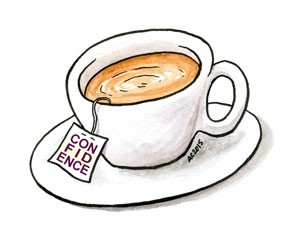This is part 1 of a series about confidence. In Part 2 of this series, I talk about security. Part 3 is about support. The introductory section is repeated so you don’t have to read them in any particular order.
Or, listen to the whole series in one track, here:
External validation is not a reliable antidote to self-doubt. It can help, but only if it validates something you are already pretty confident is true.
If your confidence is low, you extend your self-doubt to the judgements others make. Your gremlins are perfectly capable of telling you that the journal made a mistake in accepting your article (and that scathing criticism is now going to rain down on you), or that all the students that gave your course a high rating were just being nice (amplifying the voice of that one student who absolutely hated it and let it rip in the evaluation forms), or that someone made a mistake hiring you and there is no way you’re ever going to get tenure, or … or … or … I’m sure you can add your own examples…

So where does the confidence come from, that can then be validated externally?
It seems to me that there are three things that contribute to confidence:
There is a deeply personal element to what makes things feel meaningful, secure, and supportive.
External validation can either strengthen or weaken your confidence depending on how it interacts with those internal elements. External validation can feel like support if it is meaningful to you, for example.
I’m going to address each of these in turn, beginning with meaningfulness.
What makes your work meaningful?
Meaningfulness sounds like some big quasi-religious life purpose type thing. It can be. You may have a sense of what that is. But that’s not the only thing it is. Sometimes it’s just that element that makes it seem like this particular task is worth doing. Often you only recognize it when it’s absent, when a task feels worthless, pointless, trivial, or futile.
It’s really hard to motivate yourself to do the work that will get you the external validation you want (a publication, a grant, a job, a promotion) if it isn’t meaningful to you.
If the work that’s meaningful to you isn’t recognised, or worse, actively denigrated by colleagues, you may wonder why you even bother. If the work that is meaningful to you seems like something that universities should value, or is something they say they value, you may begin to wonder if there is something wrong with you.
Questioning the basis on which a decision has been made is a good indicator that your values are not aligned with the values driving the decision.
Your values will never be perfectly aligned with those of your employer. The institution is often vague about what it really values, and sometimes you learn the hard way that the work you are doing isn’t as valuable to them as you expected.
In that situation you can lose confidence.
Meaningfulness is rarely all or nothing.
You might be in the wrong job or the wrong kind of institution. It is also possible that you just need to look at bit more closely at both sides of the situation and find the places where what you find meaningful overlaps with what the institution values and rewards. Some of those places may be spaces in which the work you find meaningful will neither be rewarded nor punished.
For example, if you do research that addresses a current problem, you may wonder how meaningful publishing in peer reviewed journals really is. Think about why you chose to do research rather than become a practitioner (or stay in practice) or an activist or contribute in some other way to solving that problem. Chances are you are doing research because you think that solid research evidence is important. Establishing solid research evidence takes time and involves conversations amongst scholars that seem esoteric and/or irrelevant to those on the ground. Publishing in peer reviewed journals is how you contribute to establishing solid research evidence.
Another example, there is a lot of administrative work associated with teaching. It may not be intellectually stimulating. Like housework, it may be the kind of thing that you have to do repeatedly. And yet, those tasks are essential to enabling students to be present for the more intellectually stimulating parts of the teaching, to students being able to fully engage with the material, and to students receiving the certification they need to show others that they have learned something. You may need to remind yourself of the importance of the larger goal they contribute to, or put some effort into improving the administrative processes so that the work involved is appropriate to the ends and your work is not futile.
Knowing what you find meaningful about your work, and how different tasks contribute to your ability to do the meaningful work, will help you create your own internal guide and bolster your confidence.
The questions listed in the long quote about meaningless in this post will help you find the meaning in your tasks, or diagnose the truly meaningless. Your ability to do that is also dependent on security and support, which I’ll talk about separately.
Related Posts:
Is “number of hours” the right measure? includes a discussion of meaninglessness
Work-life balance in academic careers looks at the relationship between meaningfulness and feeling overwhelmed by your job
Confidence Tricks strategies for addressing lack of confidence.
Spotlight On: Meaningfulness Matters a round-up of all the posts about finding, maintaining and the importance of meaningfulness.
This article is a revised version of the newsletter sent on 21 September 2018. Added to the Spotlight On: Confidence in March 2024.







